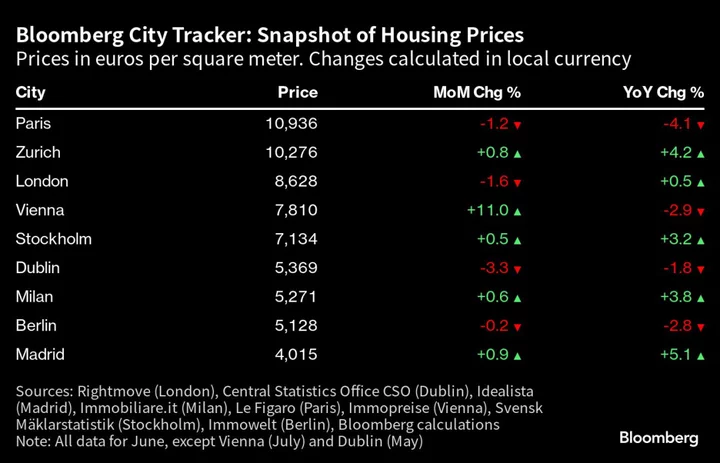Paris home prices slumped to the lowest level in four years as rising interest rates extended a downturn that gained steam during the Covid-19 pandemic.
Asking prices in June decreased 4.1% from a year ago, falling to €10,936 per square meter — the lowest level since January 2019 — according to figures compiled by Le Figaro. That’s the steepest year-on-year drop in at least a decade and represents the biggest decline in Bloomberg’s City Tracker.
The development makes the French capital an outlier. To capture the latest housing-market trends in European cities, Bloomberg compiles figures from a range of providers. Some are asking rates and indicative levels, while others are official figures.
Trends are split with prices declining in four cities, including Berlin, Dublin and Vienna, as higher financing costs dent consumer buying power.
Read More: Berlin and Munich Face Rent Surge as Buying Becomes Costlier
In Vienna, the data on asking prices has been volatile amid signs that the market is cooling. Many would-be sellers pulled listings earlier this year after failing to match up with demand, according to analysts at Raiffeisen Bank International. In July, listing prices were 2.9% lower from a year ago, compared with declines of over 12% in the previous two months.
In other cities, housing shortages are keeping up pressure. In Madrid, prices rose 5.1% in June — the biggest gain in the nine cities tracked. A housing crunch has driven up prices across Spain, where a prevalance of variable-rate mortgages has prompted homeowners to dig into savings to pay down loans.
In Stockholm, a lack of rental properties has pushed up prices despite wider real estate woes in the Nordic country.
In Paris, pandemic lockdowns prompted some people to move out of the city, and since then, some lending rule changes have limited financing for prospective investors.
French banks are not allowed to grant mortgage loans above a maximum rate, known as taux d’usure, which is set by the Bank of France. That constraint has limited lenders’ capacity to pass on the impact of higher interest rates to customers and led some to turn down loan applications.
In order to ease access to credit in the country, the cap rate has been reviewed on a monthly basis in the first half of 2023, instead of every quarter before then.
Homeowners in Paris are also facing a 52% increase in property tax this year, which Mayor Anne Hidalgo justified last year by rampant inflation and soaring energy costs.
Despite the steady drop in home prices, Paris remains the most expensive housing market among major European cities, more than double the level of Madrid and Berlin.
This story was produced with the assistance of Bloomberg Automation.
--With assistance from Marton Eder.

